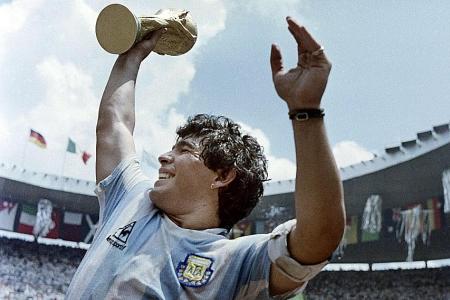Goodbye to a footballing god: Diego Maradona (1960-2020)
Maradona, who died of heart attack yesterday, was seen as greatest player by some
Football great Diego Maradona, who died late last night, less than a month after his 60th birthday, was worshipped like a god for his genius with the ball, but his demons almost destroyed him.
Maradona passed away after suffering a heart attack in his home in the suburbs of Buenos Aires, those close to him confirmed.
He had recently battled health issues and underwent emergency surgery for a subdural haematoma, a blood clot in the brain, several weeks ago.
Shortly before the announcement that shocked a nation yesterday, Argentinian media reported Maradona had suffered a serious health setback and was being treated by doctors at his home.
"There are four ambulances at the door of the residence. They have summoned family members to come. It is serious," the TyC Sports channel reported.
Argentina President Alberto Fernandez declared three days of national mourning after the news of Maradona's death.
Rising to stardom from a grimy Buenos Aires slum to lead Argentina to World Cup victory, Maradona was a rags-to-riches story in his football-mad homeland and gained the iconic status of fellow Argentinians Che Guevara and Evita Peron.
One of the most gifted players in history, Maradona's pinnacle came when he captained Argentina to World Cup glory in 1986 before plunging to misery when he was kicked out of the 1994 World Cup for doping.
Years of drug use, overeating and alcoholism truncated a stellar career and altered his appearance from the lithe athlete who could slalom effortlessly through teams to a bloated addict who nearly died of cocaine-induced heart failure in 2000.
But he reinvented himself in a stunning comeback in 2008 as coach of the Argentina team, persuading the nation's football hierarchy that with sheer charisma, he could inspire the team to victory, despite a lack of coaching experience.
He was coach of Argentinian side Gimnasia la Plata at the time of his passing.
A magician with the ball - deceptively quick and a visionary passer - Maradona is considered by some as the greatest footballer ever, edging out that other great, Brazil's Pele.
Said Pele on his rival's passing: "Sad news to lose a friend like that. May God give enough strength to his family. For sure, one day we will kick a ball together in heaven."
In Argentina, he was worshipped as "El Dios" - The God - partly a play on words on his No. 10 shirt, "El Diez".
He was largely responsible for Argentina's World Cup victory in 1986 in Mexico, scoring two famous goals in one game against England in the quarter-finals.
The first was a notorious goal scored with his fist, and the second, where he dribbled past half the England team, is often called the goal of the century.
"It was partly by the hand of God and partly with the head of Maradona," he said of his opener in the 2-1 win.
Born on Oct 30, 1960 in the Buenos Aires working class suburb of Lanus, the fifth of eight children of a factory worker, Maradona grew up in the Villa Fiorito shanty town.
Discovered in street kickabouts by the scout for first division club Argentinos Juniors, the prodigy made his league debut at 15.
In 1984, he moved to Napoli for a then world-record £6.9 million (S$12.4m) fee.
Maradona helped underdogs Napoli to the Italian title twice - creating a whole new set of adoring fans in the process.
The Italian side called his demise a "devastating blow" for both the city and the club. Club spokesman Nicola Lombardo added: "We are in mourning. We feel like a boxer who has been knocked out. We are in shock."
After the 1986 World Cup triumph in Mexico, he also coaxed a mediocre Argentina team to a second successive World Cup final in Rome in 1990.
But by 1991, drugs and alcohol began taking over his life.
That year Maradona was handed a 15-month suspension from football worldwide for doping. He was banned again for 15 months after testing positive for drugs at the 1994 World Cup in the United States.
Through the years he reflected publicly on his greatness and on his weaknesses.
"Soccer is the most beautiful and healthy sport in the world. Soccer shouldn't have to pay for my mistakes. It's not the ball's fault," he said.
- AFP, REUTERS
Get The New Paper on your phone with the free TNP app. Download from the Apple App Store or Google Play Store now


